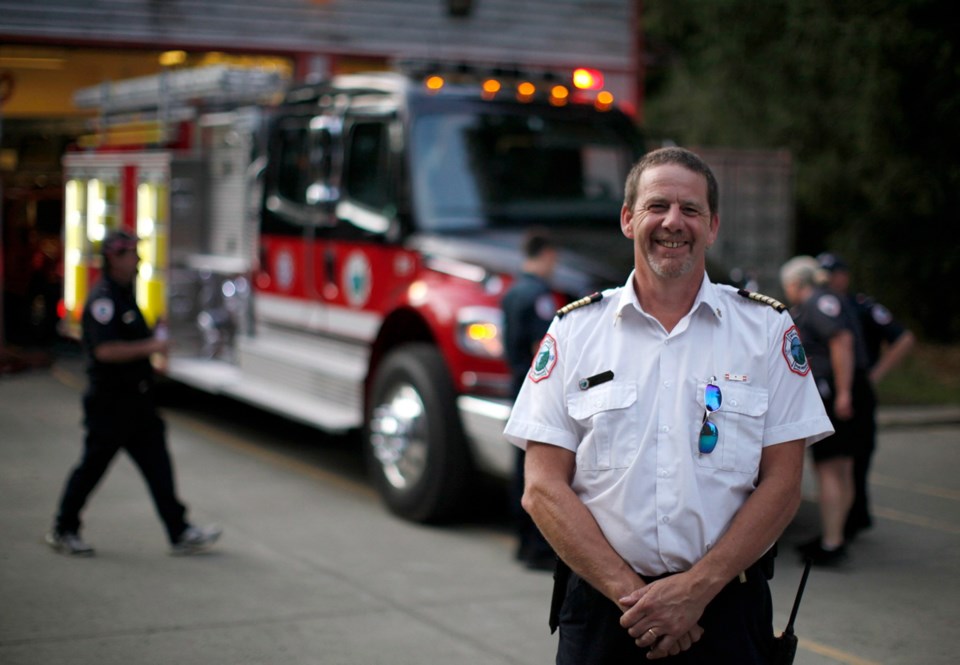Fallen power lines bouncing along roadways may produce “beautiful” and “stellar” light shows, especially in the winter, but a fire chief on southern Vancouver Island says his volunteer force shouldn’t have to respond to such calls anymore.
Rob Patterson of Malahat Volunteer Fire & Rescue says colleagues across British Columbia are feeling the strain as they take on more and more unpaid responsibilities that exceed their traditional tasks of battling flames and responding to medical emergencies and motor-vehicle crashes.
In the central Kootenay community of Winlaw, the issue boiled over recently when the department was asked to perform traffic-control duty for a community meeting following a major jet-fuel spill. The chief refused and was suspended, prompting the community’s 19 volunteer firefighters to leave their posts until the regional district agreed to lift the suspension and appoint a panel to look at the wider issue.
The provincial government lays firefighting decisions in the hands of local governments, while B.C. Hydro and federal agencies like the RCMP frequently call upon the volunteers for help.
Patterson said part of the problem is volunteers aren’t willing to say no.
“I don’t want to be the bad guy to say, ‘No. We’re not coming to do that,’” he said. “But, you know, I’m increasingly finding that I do have to say no. My guys — they’ve got to get home to their families. They’re not paid for this stuff. They’re out there, you know, half the night or half the day.”
British Columbia is served by about 350 independent, community-based fire departments that employ about 4,000 career firefighters and 10,000 volunteers, according to a 2009 report by the Fire Services Liaison Group, an organization that represents chiefs, professionals, officers and volunteers.
Of the 350 departments, 170 operate in municipalities and regional districts.
But from Victoria to communities like Winlaw, government officials are reluctant to take total responsibility for tasking volunteer departments with workloads.
Kelly Gilday, B.C.’s acting fire commissioner, said in an emailed statement the responsibility for determining resourcing needs and personnel decisions, as well as service levels and policy, rests with local governments.
“Since the needs of different communities vary, fire services are not structured one and the same. A one-size-fits-all universal framework doesn’t always meet individual needs of a community. Flexibility is key,” Gilday said.
Provincial legislation doesn’t even include provisions governing local fire services, a spokesman for the justice ministry said in an emailed statement.
Simi Heer, a spokeswoman for B.C. Hydro, said the utility hasn’t sent correspondence to volunteer departments requesting help with downed power lines, and it doesn’t expect firefighters to deal with any sort of electrical equipment.
But as emergency responders, volunteer firefighters are asked to keep members of the public and themselves at least 10 metres away from fallen power lines, she said.
Heer said B.C. Hydro asks people to call 911 when they see downed power lines, and because such incidents are emergencies, volunteer firefighters are called out as first responders.
Patterson continues to answer calls in his Vancouver Island community, regardless of the requests.
The 50-year-old chief, who has worked his way up from the department’s lowest rung, said his 22-member roster includes toy-store employees, shoe sellers, office workers and an oral surgeon, and he said all are paid $5 for attending training nights, money intended to pay for gas.
Patterson said his stipend is just a “couple grand” annually for volunteering 15 to 30 hours each week.
Patterson said he wants British Columbians to speak out.
“If they were to make mention to their councillors, their regional boards, whatever the governing bodies are, you know, ‘We don’t want our fire guys doing this ... this is not what they’re there for. Let’s not waste their valuable input.’
“I have no desire to waste my time. If I don’t have to be there, we’re gone. We’re going back to our lives. To be having any of these guys out there unnecessarily is a poor use of their volunteering abilities.”



